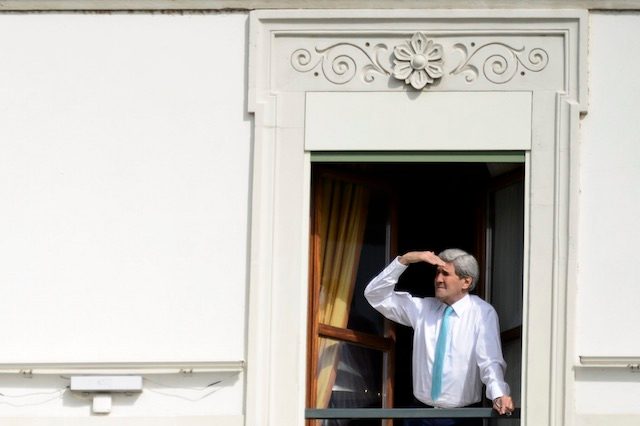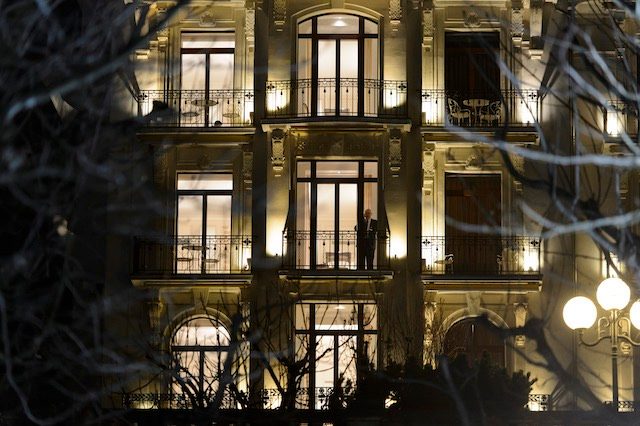SUMMARY
This is AI generated summarization, which may have errors. For context, always refer to the full article.

LAUSANNE, Switzerland (UPDATED) – Rollercoaster talks aimed at stopping Iran getting a nuclear bomb went into extra time Wednesday, April 1, with Tehran insisting it won’t be rushed into a bad deal that falls short of meeting its key demands.
Speaking after Iran and major powers missed a midnight deadline to agree the outlines of a potentially historic accord at talks that stretched into the small hours, Iran’s chief negotiator said the Iranians “won’t let time bind us in the talks.”
“Time is important to us but the content of the negotiations and our demands are more important,” Abbas Araghchi said in a live interview with state television from Lausanne.
The US, Russia, China, Britain, France and Germany want Iran to scale down its nuclear program in order to extend the “breakout” time needed for Iran to assemble a bomb’s worth of nuclear material.
Iran denies wanting the bomb and its negotiators are under strict orders from supreme leader Ayatollah Ali Khamenei to refuse any curtailing of its program without relief from painful sanctions.
Araghchi said Wednesday a deal was impossible without a “framework for the removal of all sanctions”, but global powers want any sanctions relief to be phased and easily reversible if Iran violates the deal.
The stakes are high, with fears that failure may set the United States and Israel on a road to military action to thwart Iran’s nuclear drive.
The White House warned again Tuesday that the military option to deprive the Islamic republic of nuclear arms remained “on the table”.
Contradictory signals
Russian Foreign Minister Sergei Lavrov and his Iranian counterpart Mohammad Javad Zarif had raised hopes in the early hours of Wednesday morning that the framework deal might be in sight.
Lavrov told Russian media that they had reached “an agreement in principle on all key aspects of the final settlement”, while Zarif said he hoped negotiators could “finalize” the framework on Wednesday.
But Western countries poured cold water on such expectations, with a senior US State Department official saying tersely: “All issues have not been agreed.”
An “optimistic” British Foreign Minister Philip Hammond said Wednesday a “broad framework of understanding” had been reached, but he also said there were “some key issues that have to be worked through”.
Coming away from Lausanne with a deal meant “the Iranians being willing to meet us where there are still issues to deal with,” Hammond told British media.

Hawkish French Foreign Minister Laurent Fabius, who along with Lavrov and China’s Wang Yi have now left the talks, said progress so far was “not enough”.
A German diplomat said the talks had got “stuck on several important issues… Nothing is decided but with goodwill an agreement (is possible).”
Wang issued a 4-point written statement to journalists saying “all parties must be prepared to meet each other halfway in order to reach an agreement”.
Obama briefed
Kerry, who on Wednesday went into his first bilateral meeting with Zarif in several days, overnight briefed US President Barack Obama and his national security team on the negotiations by secure video conference.
The question is how much detail will be in the framework under negotiation.
If it falls short of firm commitments by Iran, Obama could find it hard to fend off attempts by his Republican opponents to pass fresh sanctions on Tehran.
Iran’s negotiators are also under pressure from domestic hardliners not to give too much away while also delivering on President Hassan Rouhani’s promise to win the lifting of sanctions.
US Republicans fear that Iran will still be able to get the bomb – a concern shared by Israeli Prime Minister Benjamin Netanyahu, whose country is widely assumed to have nuclear weapons itself.
Netanyahu, in his fourth broadside in as many days, warned Wednesday against a bad deal that would endanger Israel, and the Middle East.
Some areas of the mooted deal, including the future size of Iran’s uranium enrichment capacity, appear to have been tentatively sewn up.
But the two sides still appear to be discussing other areas, including sanctions relief, what to do with Iran’s stockpiles of nuclear material, and how long the deal should last. – Simon Sturdee and Jo Biddle, AFP / Rappler.com
Add a comment
How does this make you feel?
There are no comments yet. Add your comment to start the conversation.